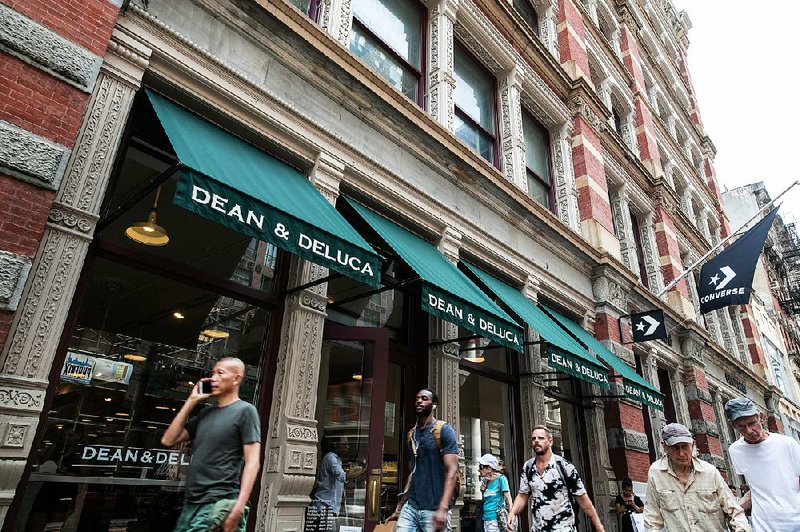Dean & DeLuca, the gourmet grocer whose trend-setting New York store introduced Americans to international delicacies more than four decades ago, is struggling to hold on as it deals with stalling sales and a cutthroat competitive landscape.
Some shelves at its flagship store are bare, and suppliers have gone to court over unpaid bills. Other U.S. locations have been shut, leaving Dean & DeLuca with only four company-operated stores in the country, its chief executive said.
Dean & DeLuca's pioneering business model helped create a cohort of upscale gourmets, but now those same consumers are being targeted by bigger rivals with deeper pockets. Items that once were hard to get are now readily available from huge chains such as Trader Joe's and Whole Foods and its online parent, Amazon.com Inc.
"There are so many other options now," said Ethan Mitchell, a film editor who stopped by the SoHo store on Prince Street this week and says he's been a regular visitor. "Whole Foods is still expensive compared to other places but cheaper than Dean & Deluca."
The pressures were evident on a recent morning visit, when shoppers were greeted by signs asking guests to "please excuse our appearance and apologies for the inconvenience," and fresh food stands that were mostly empty, covered in long black sheets of cloth.
Dean & DeLuca's owner, Bangkok-based Pace Development Corp., acknowledges that the situation has worsened in recent months, forcing a delay in payments to some suppliers.
"The lack of financial resources makes it very difficult for us to maintain the necessary investments to improve and keep our franchise competitive and attractive," Sorapoj Techakraisri, Pace's chief executive officer, said in a telephone interview last week. Outside the U.S. the company is doing well, with 70 stores in Asia. "The U.S. has a very tough environment, but it doesn't mean we will stop expansion in other regions."
The U.S. operations are being reorganized to stem losses, improve efficiency and bolster the chain's online presence, Sorapoj told a press briefing in Bangkok late last week. The company will improve the flagship store, he said.
Food and beverage sales attributed to Dean & DeLuca plunged 23% to $15.8 million in the first quarter, according to company filings, which also mentioned a debt abatement but didn't elaborate.
The unit makes up more than 60% of revenue for Pace, where total debt stood at 19 times equity at the end of the period. Pace reported an overall net loss of $103 million for the quarter, narrowing from a $132.3 million deficit a year earlier. It also warned investors in a separate filing there's substantial doubt about its solvency.
Pace said it was buying Dean & DeLuca for $140 million in 2014. The deal included licensing agreements in 31 international locations including Thailand, Singapore and South Korea.
Founded by Joel Dean and Giorgio DeLuca in 1977, the store offered food and items unavailable anywhere else, food writer and restaurant critic Joshua David Stein said in an interview. That exclusivity gave it the power to sell its goods at a premium. But savvier consumers and an interconnected world have pushed Dean & DeLuca toward obsolescence.
"Carrying around their cup was a status symbol," Stein said. "They were the first store in New York to offer extra virgin olive oil. Now Amazon has extra virgin olive oil. Everyone has extra virgin olive oil."
As business eroded, so did cash flow, and suppliers responded by taking Dean & DeLuca to court. Among them were Agri Exotic Trading Inc., which sought payment for $173,376 in produce and other goods the Clifton, N.J.-based wholesaler delivered between February and June, according to court documents. Four Seasons Produce Inc. sued to get $153,504 for goods the Ephrata, Pa., company provided.
Those claims were settled earlier this month, Gregory Brown, a lawyer representing both suppliers, said in an email. Sorapoj told The New York Times that he's planning to inject more capital to fix the business and pay its obligations.
The U.S. grocery landscape today favors scale, putting pressure on smaller chains that can't keep up with low prices offered by big chains, Bloomberg Intelligence analyst Jennifer Bartashus said in an interview.
"You get a disparity between the smaller companies that have to absorb higher wage costs, higher rent costs and higher operating costs but are unable to pass through significantly higher prices to their customers," Bartashus said.
Information for this article was contributed by Sunil Jagtiani of Bloomberg News.
SundayMonday Business on 07/21/2019
